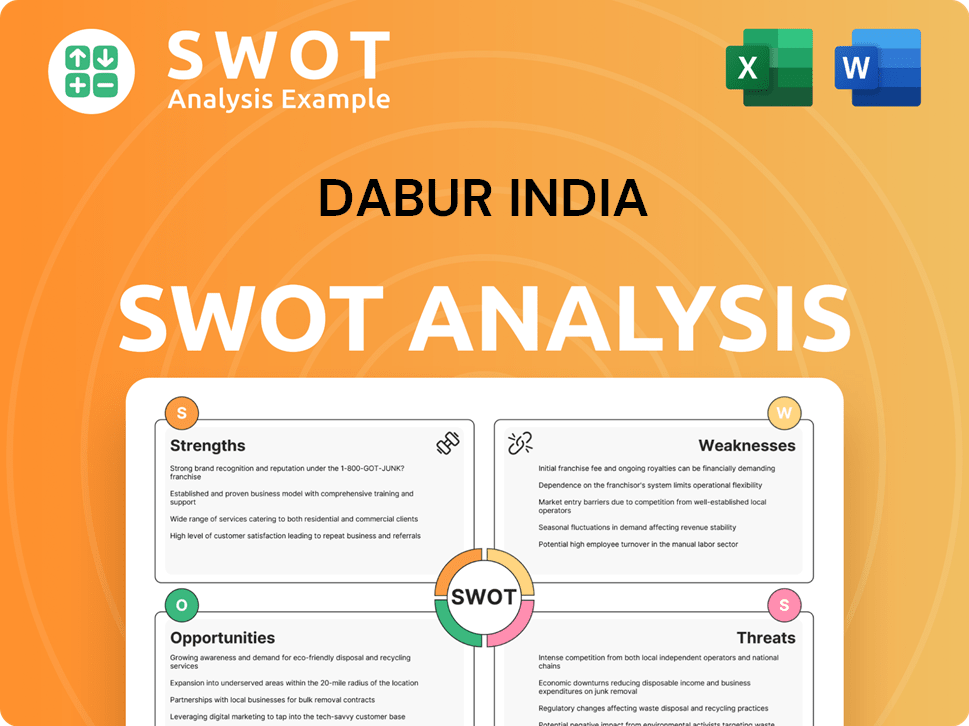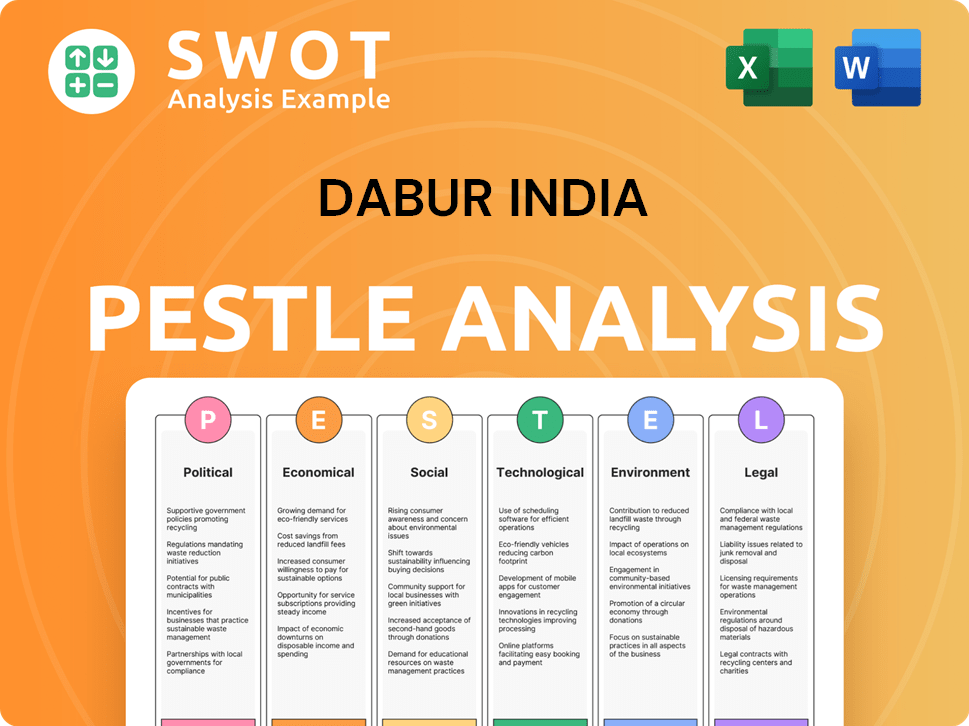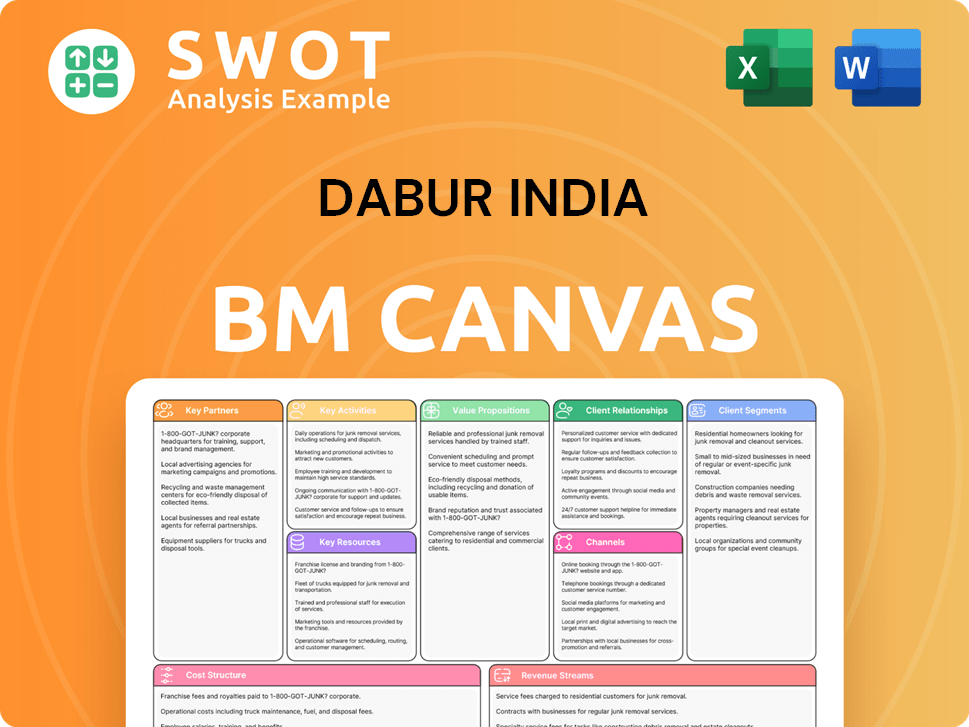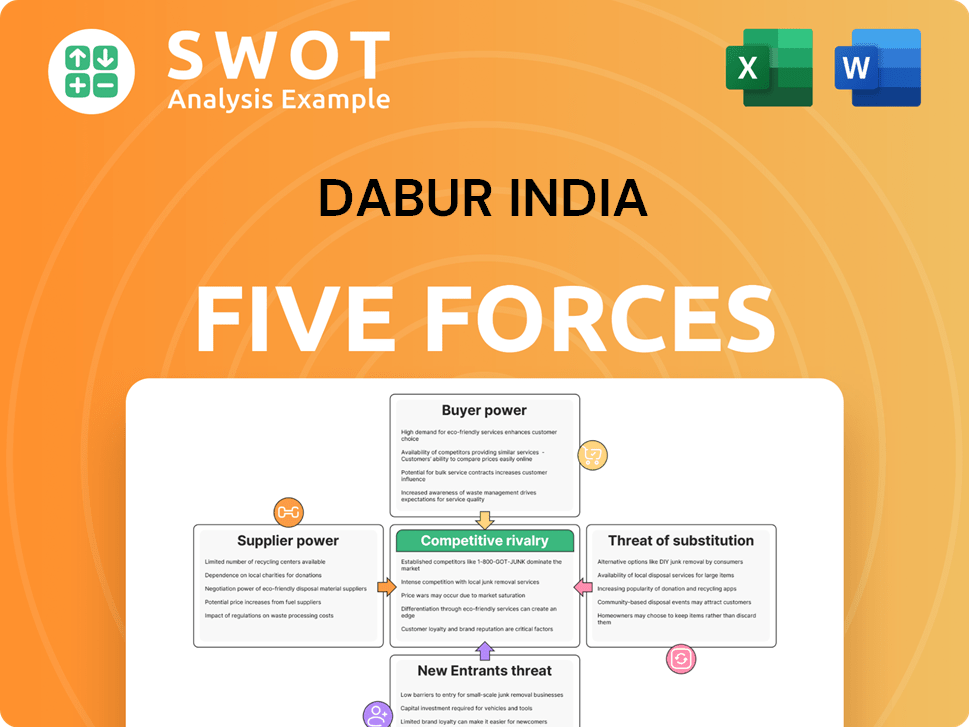Dabur India Bundle
How Does Dabur India Dominate the FMCG Market?
Dabur India, a titan in the Indian consumer goods sector, has masterfully crafted its sales and marketing strategies to lead in the Ayurvedic and natural product categories. Its success stems from a deep understanding of consumer behavior and a willingness to adapt to the ever-changing market dynamics. From its humble beginnings as a provider of Ayurvedic remedies, Dabur has evolved into a global powerhouse, consistently outperforming competitors. This evolution is a testament to the company's agile approach to sales and marketing.

This deep dive into Dabur India SWOT Analysis will uncover the secrets behind Dabur India's remarkable growth, exploring its sales and distribution network, innovative marketing campaigns, and strategic brand positioning. We'll dissect its marketing plan, examining how Dabur India strategically targets its audience and leverages its competitive advantages to maintain and expand its market share. Furthermore, we'll analyze Dabur India's digital marketing initiatives and promotional activities, providing actionable insights for investors and business strategists alike, focusing on the company's sales performance and future marketing plans.
How Does Dabur India Reach Its Customers?
The sales and marketing strategy of Dabur India, a major player in the consumer goods sector, hinges on a multi-channel approach. This strategy effectively blends traditional and modern sales channels to maximize reach across diverse consumer segments. The company's ability to adapt and evolve its sales channels has been crucial to its sustained success in the dynamic Indian market.
Dabur India's sales strategy is designed to ensure its products are readily available to consumers across various demographics and geographical locations. The company's distribution network is a key strength, allowing it to reach both urban and rural markets effectively. By leveraging both offline and online channels, Dabur aims to provide a seamless shopping experience for its customers.
The company's approach to sales and marketing is comprehensive, focusing on both traditional and digital channels. This dual strategy allows Dabur to cater to a wide range of consumer preferences and shopping behaviors. The integration of these channels is a key aspect of Dabur's marketing plan, enhancing its ability to capture market share and drive revenue growth.
Dabur India's offline sales channels are extensive, with a strong presence in wholesale distribution. This network is the backbone for reaching rural and semi-urban markets. The company's products are widely available in kirana stores, pharmacies, and general trade outlets across India.
In urban centers, Dabur India has a significant presence in modern retail chains. This includes supermarkets, hypermarkets, and departmental stores, where it leverages shelf space and promotional opportunities. Strategic partnerships with major retail giants enhance product visibility and accessibility.
E-commerce platforms have become a vital growth driver for Dabur India. Products are available on major marketplaces like Amazon, Flipkart, and BigBasket. This allows the company to cater to the growing online consumer base. Dabur has also invested in direct-to-consumer (DTC) capabilities.
Dabur's omnichannel strategy aims to provide a seamless shopping experience, whether online or offline. This approach is crucial for meeting evolving consumer expectations. The company's digital push accelerated, especially during and after the pandemic, boosting online sales.
Dabur India's sales and marketing strategy is a dynamic blend of traditional and modern approaches. The company's focus on both offline and online channels ensures broad market coverage and caters to diverse consumer preferences. For more insights into the company's structure, you can explore Owners & Shareholders of Dabur India. The company's ability to adapt to changing market dynamics and consumer behavior has been a key factor in its sustained success. Dabur India's sales performance is a testament to its effective marketing mix and strategic market positioning.
Dabur India's sales strategy is built on a robust distribution network and a growing e-commerce presence. The company's omnichannel approach aims to provide a seamless experience for consumers. This strategy has contributed significantly to Dabur's revenue growth and market share.
- Extensive wholesale distribution network for rural and semi-urban markets.
- Strong presence in modern retail chains across urban centers.
- Significant growth in e-commerce sales through major online marketplaces.
- Strategic focus on direct-to-consumer (DTC) channels.
Dabur India SWOT Analysis
- Complete SWOT Breakdown
- Fully Customizable
- Editable in Excel & Word
- Professional Formatting
- Investor-Ready Format

What Marketing Tactics Does Dabur India Use?
The marketing tactics employed by Dabur India are multifaceted, integrating digital strategies with traditional media to enhance brand awareness, generate leads, and boost sales. This comprehensive approach is crucial for maintaining and expanding its market presence. The company's strategy is designed to reach a diverse consumer base, leveraging both established and emerging channels.
Dabur India's sales and marketing strategy focuses on a blend of digital innovation and traditional methods. This dual approach helps the company build brand awareness, attract potential customers, and ultimately drive sales. By understanding its target audience and adapting to market trends, Dabur India aims to stay competitive and relevant in the consumer goods sector.
The company's marketing plan includes a strong emphasis on digital marketing, content creation, and data-driven insights. These elements are combined with traditional advertising to create a well-rounded strategy. This integrated approach is key to reaching a wide audience and achieving sustainable growth.
Dabur India's digital marketing efforts are extensive, utilizing content marketing to create engaging narratives around its Ayurvedic heritage. This includes educational content on health and wellness, distributed through blogs, articles, and videos on platforms like YouTube. The company focuses on Search Engine Optimization (SEO) to ensure its online content is easily discoverable for relevant keywords, such as 'Ayurvedic hair oil'.
Paid advertising, including Search Engine Marketing (SEM) and display advertising, plays a significant role in increasing immediate visibility and driving traffic to product pages. Email marketing is used for direct consumer engagement, offering personalized product recommendations, promotions, and health tips to segmented customer bases.
Influencer partnerships are a cornerstone of Dabur's digital strategy, collaborating with health and wellness influencers, beauty bloggers, and lifestyle personalities to promote products authentically. Social media platforms like Facebook, Instagram, and YouTube are actively used for community building, interactive campaigns, and direct consumer interaction.
Television commercials (TVCs) remain a powerful tool for mass reach, especially in India's diverse linguistic landscape, with campaigns often tailored to regional preferences. Radio and print media continue to be leveraged for targeted advertising, particularly in rural and semi-urban areas.
Dabur's approach to data-driven marketing involves analyzing consumer behavior data to refine targeting, personalize marketing messages, and optimize campaign performance. The company also invests in market research and consumer surveys to understand evolving preferences and unmet needs, informing product development and marketing strategies.
Dabur's rural distribution network expanded to over 100,000 villages by early 2024, demonstrating a concerted effort to reach a wider consumer base through both traditional and evolving marketing tactics. This expansion is a key part of its overall sales strategy, allowing for increased market penetration in underserved areas.
Dabur India's marketing strategy is a blend of digital and traditional methods, focusing on content marketing, SEO, paid advertising, email marketing, influencer partnerships, and social media engagement. The company also utilizes TV commercials, radio, and print media for broader reach. Data-driven marketing and market research are crucial for understanding consumer behavior and preferences. For more insights, you can read about the Growth Strategy of Dabur India.
- Content Marketing: Creating engaging content related to health and wellness.
- SEO: Optimizing online content for relevant keywords.
- Paid Advertising: Using SEM and display ads for visibility.
- Email Marketing: Personalized product recommendations.
- Influencer Partnerships: Collaborating with influencers.
- Social Media: Community building and interactive campaigns.
- Traditional Media: TVCs, radio, and print for mass reach.
- Data-Driven Marketing: Analyzing consumer behavior.
- Market Research: Understanding consumer preferences.
Dabur India PESTLE Analysis
- Covers All 6 PESTLE Categories
- No Research Needed – Save Hours of Work
- Built by Experts, Trusted by Consultants
- Instant Download, Ready to Use
- 100% Editable, Fully Customizable

How Is Dabur India Positioned in the Market?
Dabur India's brand positioning is deeply rooted in its Ayurvedic heritage and commitment to natural wellness. This positions the company as a trusted provider of health and personal care products. The core message centers on 'Goodness of Nature' and 'Healthy Living,' highlighting the natural ingredients and holistic benefits of its product range.
Visually, Dabur's branding often incorporates elements of nature, traditional Indian motifs, and a warm, earthy color palette, conveying authenticity and purity. The tone of voice across its communications is typically nurturing, authoritative, and trustworthy, aiming to reassure consumers about the efficacy and safety of its products. The customer experience it promises is one of natural care and well-being, fostering a sense of tradition and reliability.
Dabur's brand identity has been instrumental in driving its revenue streams and overall business success. The company's focus on natural ingredients and Ayurvedic principles has allowed it to differentiate itself from competitors. This strategy resonates strongly with Indian consumers seeking natural and chemical-free alternatives.
Dabur's core message revolves around 'Goodness of Nature' and 'Healthy Living'. This emphasizes the natural ingredients and holistic benefits of its product portfolio. This message is consistently communicated across all marketing channels.
The visual identity incorporates elements of nature, traditional Indian motifs, and a warm, earthy color palette. This conveys authenticity and purity, reinforcing the brand's commitment to natural ingredients and Ayurvedic principles. Packaging design also plays a key role.
The tone of voice is typically nurturing, authoritative, and trustworthy. This aims to reassure consumers about the efficacy and safety of its products. This approach builds trust and brand loyalty among its target audience.
Dabur promises a customer experience of natural care and well-being, fostering a sense of tradition and reliability. This is achieved through consistent product quality and effective marketing campaigns. The focus is on holistic health.
Dabur India's brand positioning strategy is built on several key elements, including its focus on natural ingredients, Ayurvedic principles, and a commitment to consumer trust. These elements work together to create a strong brand identity.
- Natural Ingredients: Dabur emphasizes the use of natural ingredients in its products, appealing to consumers seeking healthier alternatives.
- Ayurvedic Principles: The company leverages Ayurvedic principles to promote holistic health and wellness, differentiating itself in the market.
- Trust and Reliability: Dabur has built a reputation for trust and reliability through consistent product quality and effective marketing.
- Brand Consistency: Maintaining brand consistency across all channels ensures a unified message and reinforces brand recognition.
Dabur India Business Model Canvas
- Complete 9-Block Business Model Canvas
- Effortlessly Communicate Your Business Strategy
- Investor-Ready BMC Format
- 100% Editable and Customizable
- Clear and Structured Layout

What Are Dabur India’s Most Notable Campaigns?
The sales and marketing strategies of Dabur India are built on impactful campaigns that have significantly boosted its brand image and market growth. These campaigns are meticulously designed to resonate with consumers, reinforcing product positioning and driving sales. Focusing on both traditional and digital channels, Dabur India ensures a comprehensive approach to reach its target audience effectively. A deep understanding of consumer behavior allows for campaigns that not only promote products but also build lasting brand loyalty.
One of the key elements of Dabur India’s marketing plan involves the consistent use of celebrity endorsements and cause-related marketing. These strategies enhance brand visibility and credibility. This approach has been instrumental in maintaining and expanding market share across various product categories. The company's ability to adapt to changing consumer preferences and market dynamics is a critical factor in its sustained success.
Dabur India's sales strategy capitalizes on its diverse product portfolio and extensive distribution network to reach a wide audience. The company's marketing campaigns are designed to highlight the unique benefits of its products, often emphasizing health and wellness. By leveraging both traditional and digital marketing channels, Dabur ensures that its message reaches consumers effectively. This integrated approach enables the company to build strong brand recognition and drive sales growth.
This campaign consistently positions Dabur Chyawanprash as a daily immunity booster, especially relevant in the post-pandemic era. It leverages extensive TV advertising, digital campaigns on social media and health websites, and print media. This campaign has consistently driven sales lift for Dabur Chyawanprash, reinforcing its market leadership.
Focuses on the 'strength and shine' benefits of Amla. These campaigns feature celebrity brand ambassadors and aim to maintain Dabur Amla's market dominance in the hair oil segment. Channels include TVCs, digital video ads, and influencer collaborations. These campaigns result in high brand recall and sustained sales.
This cause-related marketing initiative aligns the brand with environmental sustainability. It indirectly bolsters brand perception and loyalty among socially conscious consumers. This campaign demonstrates Dabur's commitment to corporate social responsibility.
Dabur combines traditional mass media with targeted digital strategies. This includes celebrity endorsements and cause-related marketing to enhance brand visibility. This approach ensures a broad reach and strong consumer engagement, driving sales and brand loyalty.
Dabur India's marketing campaigns are a critical component of its overall strategy, contributing significantly to its market share and revenue growth. The company's ability to adapt its marketing mix to changing consumer preferences and market dynamics is a key factor in its success. For example, in fiscal year 2024, the company reported a revenue of approximately ₹ 11,832 crore, reflecting the effectiveness of its marketing and sales strategies. Further insights can be found in the Competitors Landscape of Dabur India.
Dabur leverages TV advertising, digital campaigns across social media and health websites, and print media. This multi-channel approach ensures broad reach and targeted messaging. Digital marketing initiatives are crucial for engaging younger demographics.
Campaigns often feature families and individuals leading healthy lives, linking their well-being to product consumption. Emotional narratives showcase the transformative effects of products like hair oil. These concepts build strong brand connections.
Dabur frequently uses prominent celebrities as brand ambassadors. This strategy helps reach a wider audience and enhances brand credibility. Celebrity endorsements are a key element of the marketing plan.
Initiatives like 'Save the Sunderbans' align the brand with environmental sustainability. This approach resonates with socially conscious consumers and enhances brand perception. It boosts brand loyalty.
The campaigns are designed to maintain and expand market share across various product categories. Dabur's effective marketing mix contributes to its strong market position. Continuous innovation supports market leadership.
Dabur actively uses digital platforms for targeted advertising and consumer engagement. Social media campaigns and digital video ads are integral to its strategy. Digital marketing boosts reach.
Dabur India Porter's Five Forces Analysis
- Covers All 5 Competitive Forces in Detail
- Structured for Consultants, Students, and Founders
- 100% Editable in Microsoft Word & Excel
- Instant Digital Download – Use Immediately
- Compatible with Mac & PC – Fully Unlocked

Related Blogs
- What are Mission Vision & Core Values of Dabur India Company?
- What is Competitive Landscape of Dabur India Company?
- What is Growth Strategy and Future Prospects of Dabur India Company?
- How Does Dabur India Company Work?
- What is Brief History of Dabur India Company?
- Who Owns Dabur India Company?
- What is Customer Demographics and Target Market of Dabur India Company?
Disclaimer
All information, articles, and product details provided on this website are for general informational and educational purposes only. We do not claim any ownership over, nor do we intend to infringe upon, any trademarks, copyrights, logos, brand names, or other intellectual property mentioned or depicted on this site. Such intellectual property remains the property of its respective owners, and any references here are made solely for identification or informational purposes, without implying any affiliation, endorsement, or partnership.
We make no representations or warranties, express or implied, regarding the accuracy, completeness, or suitability of any content or products presented. Nothing on this website should be construed as legal, tax, investment, financial, medical, or other professional advice. In addition, no part of this site—including articles or product references—constitutes a solicitation, recommendation, endorsement, advertisement, or offer to buy or sell any securities, franchises, or other financial instruments, particularly in jurisdictions where such activity would be unlawful.
All content is of a general nature and may not address the specific circumstances of any individual or entity. It is not a substitute for professional advice or services. Any actions you take based on the information provided here are strictly at your own risk. You accept full responsibility for any decisions or outcomes arising from your use of this website and agree to release us from any liability in connection with your use of, or reliance upon, the content or products found herein.